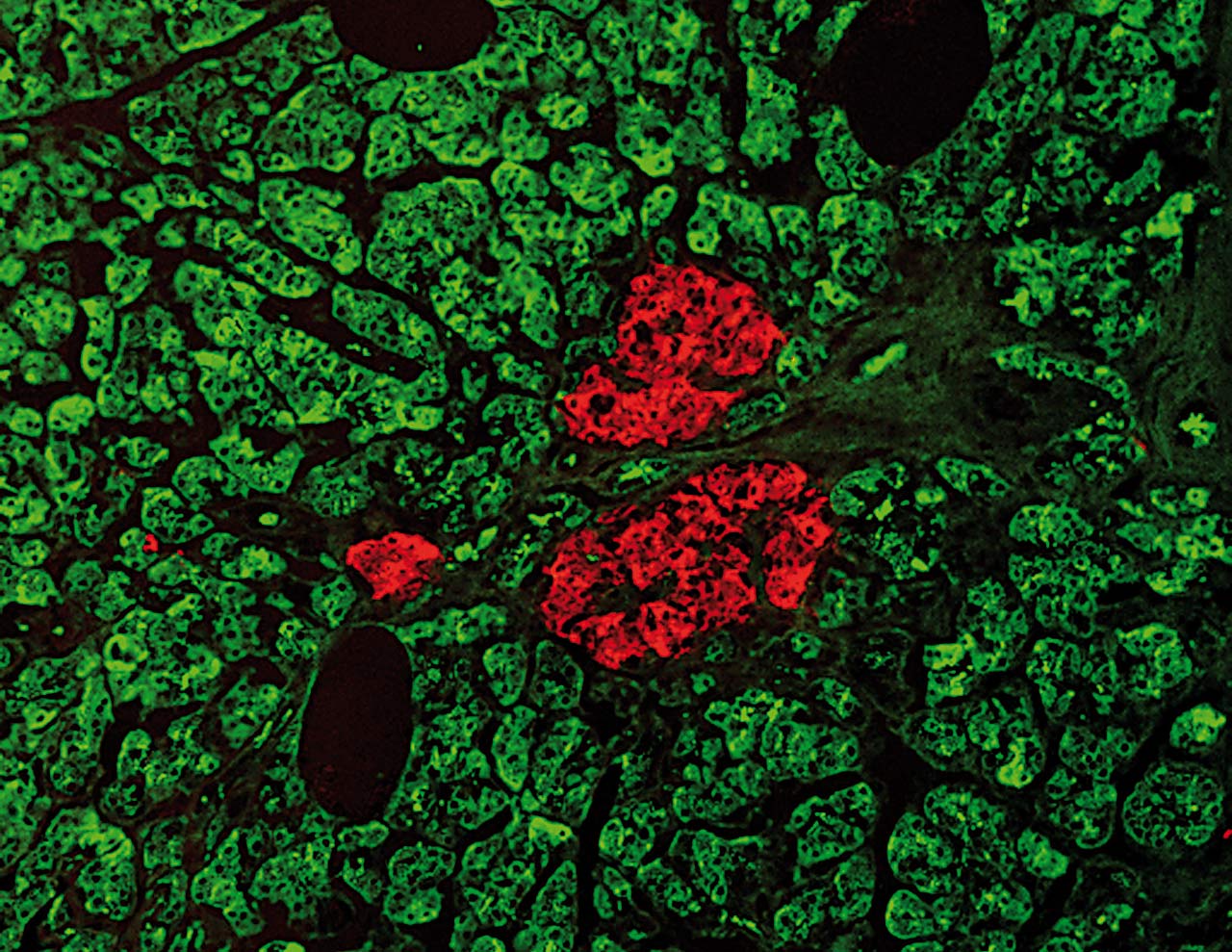
Protection of beta cells from cell death / Establishing a normal insulin secretion by pancreatic islets
Survival of beta cells in pancreatic islets and adequate production and release of insulin by beta cells are important to prevent type-2 diabetes. This diabetes is often characterized by (i) insulin secretion defects in individuals with obesity and insulin resistance and (ii) beta cell demise (i.e., beta cell death and dedifferentiation). These issues are considered to be responsible for the development of type-2 diabetes and its worsening over time (i.e. diabetes progression). At some point, diabetes progression makes it necessary to substitute beta cells by insulin injections in order to maintain close-to-physiologic blood glucose concentrations. The latter are needed to reduce and delay many diabetic long-term complications in individuals with diabetes.
The protection mechanisms of beta cells and mechanisms of normal insulin secretion represent key aspects of this research group. Besides beta cells, endothelial cells are also studied, as these cells form blood vessels and are pathologically changed during most diabetic long-term complications.
Our research group conducts functional studies on N-methyl-D-aspartate receptors (NMDARs), which modulate insulin secretion and beta cell survival. In addition, NMDARs represent drug targets for development of new anti-diabetic medication. Signaling pathways in endothelial cells of pancreatic islets, liver and heart are also studied. The key aim is to better understand the molecular mechanisms that allow beta cells to survive and adequately secrete insulin under conditions of obesity and insulin resistance. Finally, signaling pathways (including integrin-based ones) are studied in the endothelial cells of liver and heart to better understand the development of diabetic long-term complication and to therapeutically prevent these.
Team
Selected Publications
- Scholz O, Huß E, Otter S, Herebian D, Hamacher A, Levy LM, Hristeva S, Sanz M, Ajani H, Puentes AR, Hoffmann T, Hogeback J, Unger A, Terheyden S, Reina do Fundo M, Dewidar B, Roden M, Lammert E 2023. Protection of pancreatic islets from oxidative cell death by a peripherally-active morphinan with increased drug safety. Mol Metab. 75. https://doi.org/10.1016/j.molmet.2023.101775
- Pelligra A, Mrugala J, Griess K, Kirschner P, Nortmann O, Bartosinska B, Köster A, Krupenko NI, Gebel D, Westhoff P, Steckel B, Eberhard D, Herebian D, Belgardt B-F, Schrader J, Weber APM, Krupenko SA, Lammert E 2023. Pancreatic islet protection at the expense of secretory function involves serine-linked mitochondrial one-carbon metabolism. Cell Rep. 42. https://doi.org/10.1016/j.celrep.2023.112703
- Henning C, Branopolski A, Follert P, Lewandowska O, Ayhan A, Benkhoff M, Flögel U, Kelm M, Heiss C, Lammert E 2021. Endothelial β1 integrin-mediated adaptation to myocardial ischemia. Thromb Haemostasis. 121: 741-754. https://doi.org/10.1055/s-0040-1721505
- Scholz O, Otter S, Welters A, Wörmeyer L, Dolenšek J, Klemen MS, Pohorec V, Eberhard D, Mrugala J, Hamacher A, Koch A, Sanz M, Hoffmann T, Hogeback J, Herebian D, Klöcker N, Piechot A, Mayatepek E, Meissner T, Stožer A, Lammert E 2021. Peripherally active dextromethorphan derivatives lower blood glucose levels by targeting pancreatic islets. Cell Chem Biol. 28: 1474-1488.e7. https://doi.org/10.1016/j.chembiol.2021.05.011
- Urner S, Planas-Paz L, Hilger LS, Henning C, Branopolski A, Kelly-Goss M, Stanczuk L, Pitter B, Montanez E, Peirce SM, Mäkinen T, Lammert E 2019. Identification of ILK as a critical regulator of VEGFR3 signalling and lymphatic vascular growth. EMBO J. 38. https://doi.org/10.15252/embj.201899322
- Lorenz L, Axnick J, Buschmann T, Henning C, Urner S, Fang S, Nurmi H, Eichhorst N, Holtmeier R, Bódis K, Hwang J-H, Müssig K, Eberhard D, Stypmann J, Kuss O, Roden M, Alitalo K, Häussinger D, Lammert E 2018. Mechanosensing by β1 integrin induces angiocrine signals for liver growth and survival. Nature. 562: 128-132. https://doi.org/10.1038/s41586-018-0522-3
- Kragl M, Schubert R, Haiko K, Otter S, Bartosinska B, Jeruschke K, Weiß J, Chen C, Alsteens D, Kuss O, Speier S, Eberhard D, Müller DJ, Lammert E 2016. The biomechanical properties of an epithelial tissue determine the location of its vasculature. Nat Commun. 7. https://doi.org/10.1038/ncomms13560
- Marquard J, Otter S, Welters A, Stirban A, Fischer A, Eglinger J, Herebian D, Kletke O, Klemen MS, Stožer A, Wnendt S, Piemonti L, Köhler M, Ferrer J, Thorens B, Schliess F, Rupnik MS, Heise T, Berggren P-O, Klöcker N, Meissner T, Mayatepek E, Eberhard D, Kragl M, Lammert E 2015. Characterization of pancreatic NMDA receptors as possible drug targets for diabetes treatment. Nat Med. 21: 363-72. https://doi.org/10.1038/nm.3822
- Konstantinova I, Nikolova G, Ohara-Imaizumi M, Meda P, Kucera T, Zarbalis K, Wurst W, Nagamatsu S, Lammert E 2007. EphA-Ephrin-A-mediated beta cell communication regulates insulin secretion from pancreatic islets. Cell. 129: 359-70. https://doi.org/10.1016/j.cell.2007.02.044
- Lammert E, Cleaver O, Melton D 2001. Induction of pancreatic differentiation by signals from blood vessels. Science (New York, N.Y.). 294: 564-7. https://doi.org/10.1126/science.1064344
Project Funding
- Deutsche Forschungsgemeinschaft (DFG)
- Europäischer Fonds für regionale Entwicklung NRW (EFRE.NRW)
- Bundesministerium für Bildung und Forschung (BMBF)
- European Research Council (ERC)
- Deutsche Diabetes-Gesellschaft (DDG)
- Fritz-Thyssen Stiftung
Teaching Activities at Heinrich Heine University Düsseldorf
- Stoffwechselphysiologie Vorlesung (E. Lammert)
- BIO220 Tierphysiologie Praktikum (E. Lammert & C. Rose)
- V-Modul 434 Zellbiologie und Physiologie (E. Lammert)
- M-Modul 4415 Molekulare Medizin der inneren Organe (E. Lammert, B.-F. Belgardt, S. Otter)
- M-Seminar Molekulare Medizin der inneren Organe (E. Lammert)
